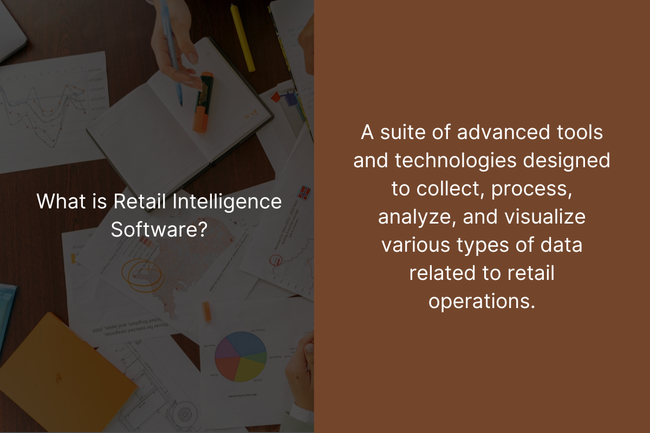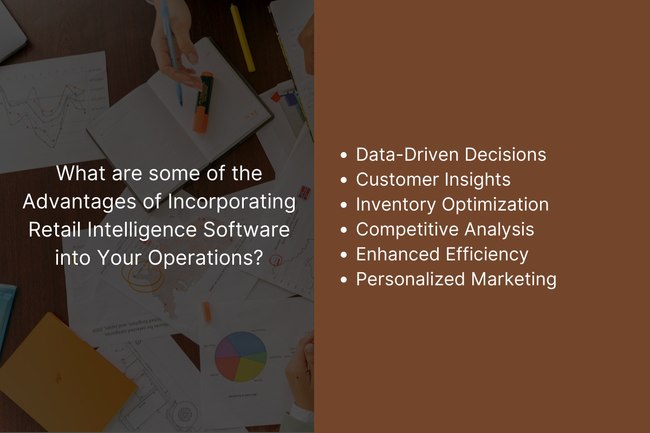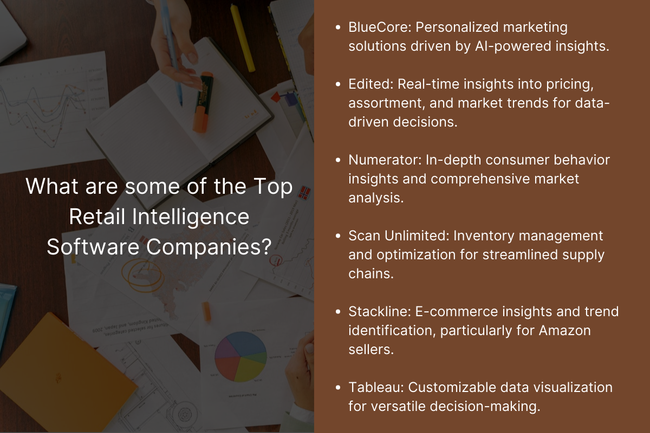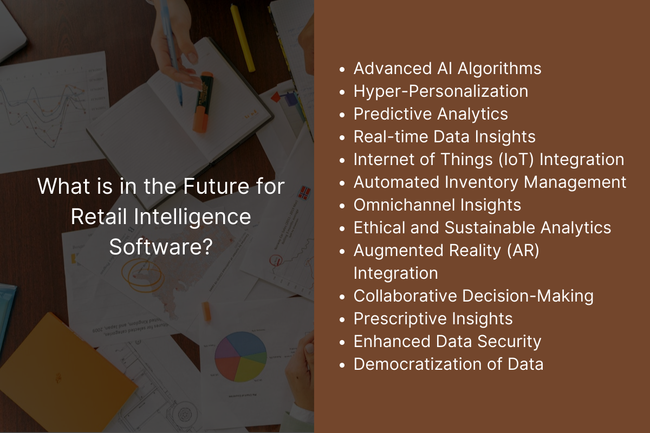In today's fast-paced retail landscape, data is more than just numbers; it's a goldmine of insights waiting to be discovered. To thrive in this competitive environment, retailers need to make informed decisions backed by data-driven insights. This is where Retail Intelligence Software comes into play, revolutionizing the way retail operations and organizations function.
Understanding Retail Intelligence Software
Retail Intelligence Software refers to a suite of advanced tools and technologies designed to collect, process, analyze, and visualize various types of data related to retail operations. This software empowers retailers to gain a deeper understanding of customer behavior, sales trends, inventory management, supply chain efficiency, and more. By leveraging these insights, retail businesses can optimize their strategies, enhance customer experiences, and ultimately drive growth.

Benefits of Retail Intelligence Software
Incorporating Retail Intelligence Software into your operations offers a multitude of benefits that can significantly elevate your business in the ever-evolving retail landscape. By utilizing this advanced technology, retailers gain the advantage of making informed decisions based on real-time, accurate data, replacing uncertain gut feelings or assumptions with concrete insights. This foundation of data-driven decision-making enables retailers to stay agile and responsive in an increasingly competitive market.
Moreover, Retail Intelligence Software provides unparalleled access to valuable customer insights. Retailers can delve into customer preferences, buying behavior, and demographics, facilitating the crafting of highly targeted marketing campaigns that resonate with individual segments. This personalized approach not only enhances customer engagement but also cultivates brand loyalty, resulting in stronger customer relationships and higher retention rates.
In the realm of inventory management, Retail Intelligence Software proves indispensable. By predicting demand patterns and analyzing historical data, retailers can optimize their inventory levels, avoiding both costly overstock situations and frustrating stockouts. This proactive approach streamlines supply chains, reduces unnecessary expenditures, and ultimately boosts overall operational efficiency.
Staying ahead of competitors is a perpetual challenge in the retail sector, and Retail Intelligence Software is a powerful ally in this endeavor. By closely monitoring competitors' activities, pricing strategies, and emerging market trends, retailers can adapt their own strategies in real-time, ensuring they remain at the forefront of innovation and market dynamics.

Efficiency gains are another prominent advantage of Retail Intelligence Software. Routine tasks can be automated, workflows streamlined, and resources allocated more effectively. This not only saves valuable time but also contributes to cost savings, enabling retailers to redirect resources toward more strategic initiatives.
Perhaps one of the most remarkable benefits is the ability to craft personalized marketing strategies that resonate deeply with specific customer segments. Leveraging the insights provided by Retail Intelligence Software, retailers can tailor their messaging, product recommendations, and promotions to align with individual preferences. This personal touch significantly enhances conversion rates, driving sales and revenue growth.
In essence, Retail Intelligence Software empowers retailers to harness the full potential of data for strategic decision-making, creating a competitive edge in an industry characterized by constant change. By embracing this technology, businesses can optimize operations, deepen customer relationships, and position themselves for success in the dynamic world of retail.
Key Features and Selection Criteria
When selecting a Retail Intelligence Software for your business, keep these key features in mind:
- Data Integration: The software should seamlessly integrate with various data sources, such as POS systems, CRM platforms, and e-commerce platforms.
- Advanced Analytics: Look for tools that offer advanced analytical capabilities like predictive analytics, machine learning, and AI-driven insights.
- Customizable Dashboards: The ability to create personalized dashboards with relevant KPIs is crucial for tracking performance in real-time.
- Visualization: Visual representations of data through charts, graphs, and heatmaps make complex data easier to understand.
- Scalability: Ensure that the software can handle your data load and grow alongside your business.

Top Retail Intelligence Software Companies: A Comparison
As the retail landscape evolves at an unprecedented pace, the need for data-driven decision-making has become paramount. Retailers across the globe are embracing the power of Retail Intelligence Software to gain insights into customer behavior, optimize inventory management, track market trends, and enhance their overall strategies. With a plethora of options available, each catering to specific aspects of the retail business, choosing the right Retail Intelligence Software can be a daunting task.
In this section, we will delve into a comparative analysis of some leading Retail Intelligence Software companies, each offering unique features and capabilities. By understanding the pros and cons of these platforms, you'll be better equipped to make an informed choice that aligns with your business goals and operational requirements. Whether you're focused on personalized marketing, inventory optimization, e-commerce insights, or broader market analysis, this comparison will provide valuable insights to guide your decision-making process.
Join us as we explore the distinctive features, advantages, and considerations of the following Retail Intelligence Software solutions:
- BlueCore: Personalized marketing solutions driven by AI-powered insights.
- Edited: Real-time insights into pricing, assortment, and market trends for data-driven decisions.
- Numerator: In-depth consumer behavior insights and comprehensive market analysis.
- Scan Unlimited: Inventory management and optimization for streamlined supply chains.
- Stackline: E-commerce insights and trend identification, particularly for Amazon sellers.
- Tableau: Customizable data visualization for versatile decision-making.
By examining the features, pros, and cons of each platform, you'll be better prepared to select the Retail Intelligence Software that best suits your retail business's unique needs. Let's dive into the details and uncover the right solution to unlock your retail business's full potential.
BlueCore
BlueCore's Retail Intelligence Solution is designed to help retailers understand and engage with their customers through personalized marketing strategies. The platform utilizes AI-driven insights to provide recommendations for targeted campaigns that resonate with individual shoppers.
Pros:
- Personalization expertise: BlueCore excels in offering personalized marketing solutions, leveraging AI to deliver highly tailored messages and product recommendations.
- Seamless integration: The platform easily integrates with various data sources, including e-commerce platforms and customer databases.
- Real-time insights: Retailers can access real-time data and analytics, enabling them to make timely decisions based on the latest information.
- A/B testing: BlueCore's A/B testing capabilities allow retailers to fine-tune their marketing strategies for optimal results.
Cons:
- Focus on marketing: While BlueCore excels in personalized marketing, it may not cover as broad a range of retail intelligence functions as some other platforms.
- Learning curve: Leveraging the full potential of the AI-driven features might require some learning and experimentation, particularly for users unfamiliar with AI technology.
Edited
Edited provides a Retail Intelligence platform that focuses on real-time insights into pricing, assortment, and trends. It empowers retailers to make data-driven decisions that align with market demands.
Pros:
- Real-time data: Edited provides up-to-the-minute information on pricing, assortment changes, and trends in the retail landscape.
- Competitive analysis: Retailers can gain insights into their competitors' strategies, enabling them to stay ahead in a dynamic market.
- Trend predictions: The platform uses historical and real-time data to predict upcoming trends and consumer preferences.
- Easy-to-use interface: Edited's user-friendly interface makes it accessible for various team members, from merchandisers to executives.
Cons:
- Limited customer behavior insights: While Edited excels in market trends and competitor analysis, it might not offer as in-depth customer behavior insights as some other platforms.
- Pricing: Pricing for Edited's services may be higher for smaller retailers, making it a more suitable option for mid-sized to large businesses.
Numerator
Numerator's Retail Intelligence solution focuses on consumer insights and market analysis. It offers a comprehensive view of consumer behavior, helping retailers understand their audience better.
Pros:
- Consumer behavior insights: Numerator provides detailed information about consumer preferences, shopping habits, and brand loyalty.
- Market trends: The platform offers insights into market trends and dynamics, allowing retailers to adjust their strategies accordingly.
- Competitive benchmarking: Retailers can compare their performance with competitors to identify strengths and areas for improvement.
- Data accuracy: Numerator emphasizes data accuracy and quality, ensuring that retailers base decisions on reliable information.
Cons:
- Complexity: The abundance of data and insights might initially seem overwhelming, requiring time to navigate and extract valuable information effectively.
- Learning curve: The platform's advanced features might require training for users unfamiliar with sophisticated retail intelligence tools.
Scan Unlimited
Scan Unlimited's Retail Intelligence solution focuses on inventory management and optimization. It provides insights into stock levels, replenishment strategies, and supply chain efficiency.
Pros:
- Inventory optimization: Scan Unlimited helps retailers reduce stockouts and overstock situations by providing insights into demand patterns.
- Supply chain insights: The platform offers valuable data on supply chain performance, enabling retailers to streamline operations.
- Real-time monitoring: Retailers can track inventory levels in real-time, ensuring accurate decision-making regarding restocking and purchasing.
Cons:
- Specialized focus: While Scan Unlimited excels in inventory management, it may not provide the same breadth of features for other retail intelligence aspects.
- Interface customization: The level of interface customization might be limited compared to other platforms, which could impact user preferences.
Stackline
Stackline's Discover platform focuses on e-commerce insights, helping retailers optimize their online presence and digital marketing strategies.
Pros:
- E-commerce expertise: Stackline specializes in online retail, offering insights into digital marketing, SEO, and online sales performance.
- Amazon-focused insights: The platform provides in-depth data and analysis specifically for Amazon sellers, a significant advantage for businesses operating on the platform.
- Trend identification: Stackline helps retailers identify emerging trends in the e-commerce landscape, guiding product and marketing strategies.
Cons:
- Limited offline insights: Stackline's primary focus is on online retail, so it might not provide as much insight into offline operations for brick-and-mortar stores.
- Niche focus: While its Amazon-focused insights are valuable for Amazon sellers, it may not cover a broad spectrum of e-commerce platforms.
Tableau
Tableau is a data visualization platform that can be customized for various industries, including retail. It empowers retailers to create meaningful visualizations from their data for informed decision-making.
Pros:
- Customizable visualizations: Tableau allows retailers to create tailored visualizations that align with their specific business needs.
- Integration flexibility: The platform can integrate with various data sources, enabling retailers to centralize their data for analysis.
- User-friendly interface: Tableau's intuitive interface makes it accessible to users of varying technical backgrounds.
- Scalability: Tableau can accommodate businesses of different sizes, from small retailers to enterprise-level operations.
Cons:
- Learning curve: Creating advanced visualizations might require a learning curve for users who are new to data analytics and visualization tools.
- Lack of specialized features: While Tableau is versatile, it might not offer as specialized retail intelligence features as platforms dedicated solely to the retail industry.
Remember that the choice of Retail Intelligence Software should align with your business's specific needs, whether you prioritize personalized marketing, inventory management, e-commerce insights, or broader market analysis. Carefully consider the pros and cons of each platform to make an informed decision that propels your retail business toward success.
The Future of Retail Intelligence Software
The future of Retail Intelligence Software looks incredibly promising. As technology advances, we can expect even more sophisticated AI algorithms, improved data accuracy, and enhanced automation. Retailers will benefit from quicker and more precise insights, enabling them to adapt swiftly to changing market dynamics and customer preferences.

In Conclusion
Retail Intelligence Software has emerged as a game-changer in the retail industry. By harnessing the power of data, retailers can unlock valuable insights that drive strategic decision-making, boost operational efficiency, and foster customer loyalty. As you explore the options available, remember to prioritize the features that align with your business goals, and keep an eye on the horizon for the exciting innovations that the future of Retail Intelligence Software holds.

